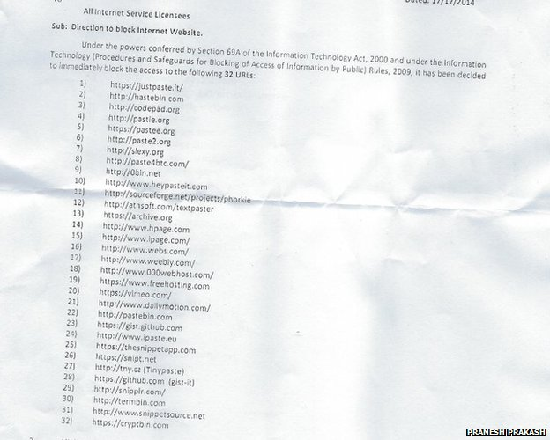India 'jihadi' web blocking causes anger
A government block on more than 30 high-profile websites has caused anger across India.
The story was published in BBC on January 2, 2015. It was also mirrored in the Puffington Post the same day. Pranesh Prakash is quoted.
India's Department of Telecoms ordered the blocking of the sites in order to prevent the publicising of "jihadi activities".
After considerable pressure, four of the sites - Weebly, Vimeo, Daily Motion and Github - were unblocked.
Officials said the other sites would have their blocks lifted if they complied with the "law of the land".
The Indian Ministry for Communication and Information Technology said in a statement: "It was stated that Anti National group are using social media for mentoring Indian youths to join the Jihadi activities."
It went on to say that the primary concern was that users posting material on the sites did not require any authentication, and that identities could be hidden.
The four websites that have been unblocked were said to have worked with the Indian government to address concerns - although it is unclear what changes, if any, have been made.
Some users were reporting that they were still unable to reach the apparently unblocked sites.
Pranesh Prakash, from the India-based Centre for Internet and Society, said: "Any intelligent person can see these sites don't incite terrorism."
'Many complaints'
Ahead of the ban lifting, a Vimeo spokeswoman said: "It is Vimeo's longstanding policy not to allow videos that promote terrorism, and we remove such videos whenever we become aware of them.

"We have not received notice from the Indian government concerning such videos and have contacted them requesting the blocking order to identify, and evaluate the video in question."
Many internet users in the country are angry that other sites remain blocked, in particular Pastebin - a site used for "dumping" text online anonymously - and The Internet Archive, a US organisation that offers a database of old websites.
The Internet Archive said on Twitter that it had received "many complaints" from users who were unable to access the service.
India has a history of sporadically blocking websites, or issuing warnings about online content.
In August 2012, 245 sites were blocked by the government in an attempt, it said, to quell violence.

